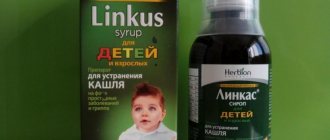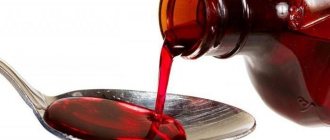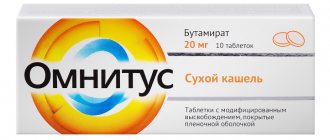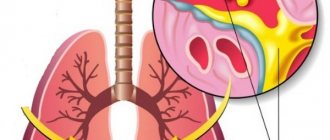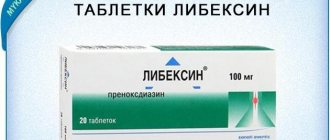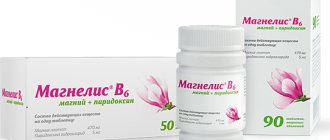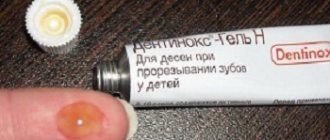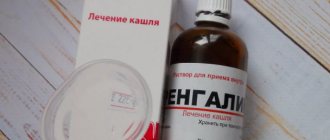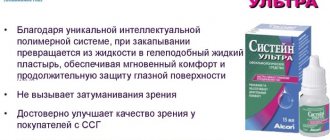Tussamag is a cough syrup containing herbal ingredients. Has antimicrobial and expectorant effects. The main active ingredient is liquid thyme extract. The medicine is used in the treatment of diseases of the upper respiratory tract, in which the discharge of sputum is difficult. Thyme extract helps thin mucus and facilitate its better evacuation. In addition, it reduces inflammation of the bronchial mucosa. Before taking Tussamag, you must read the instructions. The correct dosage of the drug is the key to successful recovery.
…
Compound
Tussamag includes liquid thyme extract as the active ingredient. An additional component of the drops is liquid sorbitol .
Auxiliary components of the syrup: sodium benzoate, hydrochloric acid 25%, cerestar caramel 15750, water, thick alcohol extract of chestnut leaves, glycerol 85%, sucrose.
In addition, Tussamag syrup is available without sugar. It contains additional substances such as potassium sorbate, caramel, sorbitol 70%, citric acid monohydrate, glycerol 85%, water.
By-effect
At the moment, no cases of drug overdose have been recorded in medical practice.
The manufacturer indicates in the instructions that in some cases cough syrup can cause some side effects, among which are the following:
- attacks of nausea;
- allergic skin rashes;
- itching and burning of the skin.
Side effects while taking the medication develop extremely rarely; in most cases, it is well tolerated by the body of both adults and children.
Christina, 25 years old: “I started coughing. I went to the pharmacy looking for an expectorant. The pharmacist Tussamag recommended it to me. The instructions say that the medicine contains herbal ingredients. I decided to give it a try anyway. The taste of the syrup is quite pleasant, as is the aroma. It's easy to drink. The drug thins and removes mucus well. After three days I started to feel better, but the cough went away completely after 10 days. I needed two bottles for the entire course of treatment, and not one - a very large expense. The instructions describe the side effects that may occur, but I’m not complaining about anything - I haven’t encountered any side effects.”
Pharmacodynamics and pharmacokinetics
The medicine thins and reduces the viscosity of sputum , and also helps normalize breathing. Thyme extract has an expectorant effect, reduces swelling and inflammation of the mucous membrane.
The main component of the extract is quickly absorbed from the gastrointestinal tract. thymol sulfate is detected the plasma 20 minutes later . Its maximum concentration is observed after approximately 2 hours. The half-life is 10.2 hours. The active component is excreted through the lungs and in the urine after a day. Renal clearance – 0.27 l/h.
Medicinal properties
Tussamag syrup is intended to combat debilitating coughs of various origins.
Main pharmacological properties of the drug:
- Has expectorant properties.
- Helps thin mucus.
- Activates the relief of spasms of smooth muscle tissue in the bronchi.
- Reduces the viscosity of sputum, accelerating the process of its removal from the respiratory tract.
- Has a pronounced antimicrobial effect.
- Reduces swelling and inflammation of the mucous surface of the larynx.
- Normalizes the functioning of the respiratory system.
When administered orally, Tussamag is quickly absorbed from the gastrointestinal system; the maximum concentration of the active component in the blood plasma is observed 1.5-2 hours after administration.
Valeria, 31 years old: “At night, my daughter woke up because it became difficult for her to breathe. She complained that her neck seemed to be squeezing. In the morning a cough appeared, but the sputum did not come out. Let's go to the doctor. He prescribed Tussamag herbal syrup, among other medications. My daughter is 5 years old. I read in the instructions that you need to give 5 ml three times a day. The product is good, the baby felt better after 4 days.”
The active substance is excreted by the kidneys and urine after about 20-24 hours.
Instructions for use of Tassamaga (Method and dosage)
For those who take Tussamag syrup orally, the instructions for use inform that adult patients should do this in a dosage of 10-15 ml. In addition, the drug can be given to children. Children 1-5 years old should take 5 ml, while children 6-17 years old should take 5-10 ml. The drug must be taken in the indicated dosages every day 2 or 3 times.
Drops are also taken orally. This can be done undiluted, as well as on a piece of sugar or in an aqueous solution.
Instructions for use of Tussamag in the form of drops recommend the following daily dosages:
- adults are prescribed 40-60 drops, which are taken 3-4 times;
- children 1-5 years old are prescribed 10-25 drops, which are taken 2 or 3 times;
- children aged 5 years and older take 3 times 20-50 drops.
When is the drug contraindicated?
Despite all its positive properties, Tussamag drops have several contraindications for use, which every patient should be aware of before use. Therefore, you must read the instructions before your first use.
The instructions for use attached to Tussamag say that the medicine is strictly not recommended for use in the following cases:
- renal or hepatic dysfunction;
- chronic heart failure;
- children's age from birth to 12 months;
- period of pregnancy and breastfeeding;
- individual intolerance to the active components included in the drug.
The medicine is not recommended for use in severe forms of diabetes mellitus and liver diseases. In such cases, the use of the drug is carried out exclusively under strict medical supervision.
Svetlana, 30 years old: “I gave Tussamag syrup to my child for a cough. My daughter drank it with pleasure. The syrup has a pleasant aroma and taste. Its main active ingredient is thyme. According to the instructions, I gave 5 ml of the product three times a day. Tussamag clears up coughs well - this is not the first time we have been saved by it. The only thing is that you need to drink it for at least a week for the cough to go away completely. And it’s not so easy to find it in pharmacies. Not everyone has it.”
Tussamag price, where to buy
The cost of the medicine in the form of drops in most pharmacies is about 200 rubles. The price of Tussamag in the form of syrup is on average 220 rubles.
- Online pharmacies in RussiaRussia
- Online pharmacies in KazakhstanKazakhstan
Pharmacy Dialogue
- Tussamag (syrup 200ml)Merckle GmbH
RUR 294 order - Tussamag (syrup 175g without sugar)Merckle GmbH
RUB 275 order
show more
Restrictions and prohibitions
Despite its natural composition, Tussamag can cause side effects in the form of an allergic reaction. Therefore, strict treatment restrictions apply to people with individual intolerance to the components.
Also included in the list of contraindications are:
- pregnancy, lactation period;
- renal and liver failure;
- severe pathologies of the heart and blood vessels.
It does not recommend using a natural remedy to treat cough in patients with diabetes mellitus or alcoholism.
Comments (4)
Nika
10/26/2018 at 11:03 pm |
I wonder how much this product costs? I usually do all sorts of inhalations for coughs, I use tablets, but not syrups. If this drug is not very expensive, then you can try it.Answer
Valeria
05.11.2018 at 23:18 |
Pertussin is a good analogue, I tried it once when I had a cough and it calms it down well, but I can’t call it a super remedy, although it’s much better than not using anything.
Answer
Natasha
07.11.2018 at 23:04 |
Mucaltin is said to help quite well, it is not expensive, but the syrups are good in their own way, it is important to choose for yourself what helps, because each person’s body is very individual.
Answer
Inga
11/12/2018 at 11:11 pm |
I like Fluditec for coughs, it helps me very well. But I can’t say anything about small children, how it will affect them, the taste is tolerable, the main thing is the result, and it is there. The product is not cheap.
Answer
Peculiarities
The active component of cough syrup is a natural herbal extract. It is for this reason that the medicine may have an opaque, cloudy color, and a slight sediment may appear at its bottom. Such changes have absolutely no effect on the effectiveness of the medicine.
Before using the drug, you should remember that any pharmacological form of it contains a certain proportion of ethyl alcohol. For this reason, patients with alcoholism take the drug under constant medical supervision.
Patients suffering from diabetes mellitus should take into account that the product contains sucrose or sorbitol, which can aggravate the course of the disease. Therefore, it is recommended to replace the drug with an analogue that does not contain sugar.
Syrup and cough drops can be purchased at pharmacies without a prescription. The medicine must be stored in a dark and cool place, away from children and direct sunlight.
Analogues of the drug in syrup form
The medicine cannot always be used to treat cough due to the presence of side effects. If it is impossible to use Tussamag to treat a nonproductive cough, analogues that are similar in composition or action are used.
| Analogue | Action |
| "Pectolvan ivy" | A complex drug that has wound healing, anti-inflammatory and antioxidant effects. The product contains saponins, which inhibits the activity of bacteria and microbes. The medicine also has an expectorant, antispasmodic and mucolytic effect. |
| "Gelisal" | The medicine relieves pain in the throat and has a mucolytic and expectorant effect. |
| "Bronchicum" | The medicine contains only herbal ingredients. Thanks to its composition, it has an expectorant, bronchodilator, antimicrobial, and anti-inflammatory effect. It allows you to reduce the viscosity of accumulated mucus and facilitate its removal. |
| "Doctor Mom" | The components included in the composition soften a sore throat. The drug has a mucolytic, expectorant, secretomotor, sclerotic anti-inflammatory effect. |
| "Pertussin" | A drug of plant origin, which is available in the form of syrup. It has an expectorant effect, helps remove phlegm, and has a mucolytic effect. Thanks to its action, the drug helps calm cough. |
| "Eucabalus" | Contains plantain and thyme extract. The drug allows you to dilute sputum and facilitate its removal. The drug has a number of contraindications and possible side effects. |
| "Gedelix" | The active component of the product is ivy extract. It has mucolytic, antispasmodic and expectorant effects. It is important not to use the medicine simultaneously with antitussive drugs, as this reduces their effect and makes it difficult to clear sputum. |
Ambrobene tablets: purpose, dosage and analogues
When using analogues, it is important to study the instructions included in the package and also follow the dosage. You should also make sure that there are no contraindications for use.
Tussamag syrup is used to treat cough. Thanks to the active substances, it allows you to dilute accumulated mucus and facilitate its removal from the respiratory tract. The drug should be taken in accordance with the instructions for use, observing the indicated dosages. If unpleasant symptoms occur, you should stop taking the drug and consult a doctor.
Contraindications for use
- chronic heart failure in the stage of decompensation;
- renal failure;
- liver failure;
- pregnancy;
- breastfeeding period;
- children under 1 year of age;
- hypersensitivity to the components of the drug.
Carefully _
Tussamag drops should be used orally for alcoholism and severe liver diseases.
Carefully _
Tussamag syrup should be used in patients with diabetes mellitus.
Tussamag with codeine
From the digestive system: more often - constipation; less often - dry mouth, anorexia, nausea, vomiting; rarely - gastralgia, spasms in the gastrointestinal tract, spasm of the biliary tract, paralytic intestinal obstruction, toxic megacolon (constipation, flatulence, nausea, stomach cramps, vomiting); frequency unknown - hepatotoxicity (dark urine, pale stools, icterus of the sclera and skin).
From the nervous system and sensory organs: more often - drowsiness; less often - dizziness, headache, fatigue, nervousness, confusion (hallucinations, depersonalization), blurred visual perception (including diplopia), in children - paradoxical agitation, anxiety; rarely - restless sleep, nightmares, convulsions, depression, at high doses - muscle rigidity (especially respiratory), tremors, involuntary muscle twitching, frequency unknown - ringing in the ears, deterioration of coordination of movements of the eyeballs with blurred vision, increased tone of smooth muscles ( at doses above 60 mg).
From the cardiovascular system: less often - arrhythmias (tachy- or bradycardia), decreased blood pressure; frequency unknown - increased blood pressure.
From the respiratory system: less often - atelectasis, depression of the respiratory center.
From the urinary system: less often - decreased diuresis, spasms of the ureters (difficulty and pain when urinating, frequent urge to urinate); frequency unknown - bladder atony.
Allergic reactions: less often - skin rash, urticaria, itching, facial swelling, bronchospasm, laryngeal edema, laryngospasm.
Other: less often - sweating, an imaginary feeling of well-being, a feeling of discomfort; frequency unknown - weight gain; with long-term use - drug dependence, withdrawal syndrome. Overdose. Overdose. Overdose. Symptoms of acute and chronic overdose: cold sticky sweat, confusion, dizziness, drowsiness, decreased blood pressure, nervousness, fatigue, bradycardia, severe weakness, slow difficulty breathing, hypothermia, anxiety, miosis, convulsions, in severe cases - loss of consciousness, respiratory arrest , coma.
Treatment: gastric lavage, restoration of breathing and maintenance of cardiac activity and blood pressure; IV administration of a specific antagonist of opioid analgesics - naloxone.
special instructions
Drops include 19% ethanol by volume, syrup and syrup 9% - 4% ethanol by volume.
Patients with diabetes should definitely consider the following when treating with Tussamag:
- syrup 9%: 1 teaspoon contains 1.85 g of sorbitol (equal to 0.15 XE);
- syrup: 1 teaspoon contains 3.3 g of sucrose (equal to 0.28 XE);
- drops: 20 drops contain 0.35 g of sorbitol (equal to 0.03 XE).
The drug contains a plant extract, so the formation of sediment in the bottle and slight turbidity of the solution are acceptable and do not affect the effect of Tussamag on the body.

